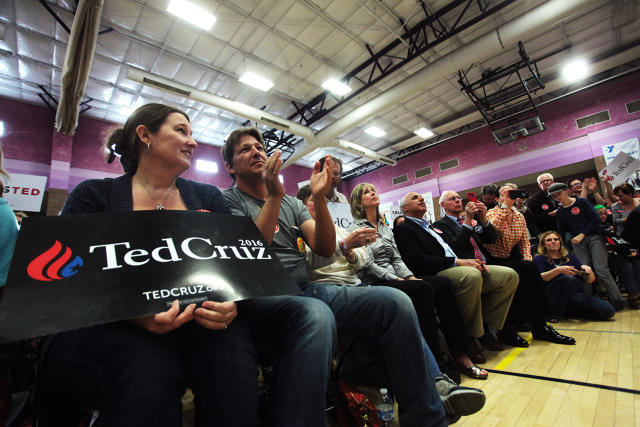The Psychology Behind Why People Support Certain Presidential Candidates
Why does a Trump supporter support Trump and a Sanders supporter support Sanders? At first that question might seem a bit nonsensical. Or it’s easy to jump to the “obvious” answer: because each candidate is espousing views their specific supports agree with. Yet for some, that answer is based on outdated old-world political science reasoning.
In the burgeoning field of neuropolitics, the science of studying how a person’s brain affects their political thoughts and actions, or why a particular person supports one candidate over the other comes down to the fact that the supporters’ underlying psychological thought processes determine, to a large extent, whether they see a candidate’s leadership style as appealing or not.
Several studies have now shown that physical differences in the brain predispose people to being liberal or conservative. “There are some brain differences overall, not completely,” says Dr. Gail Saltz is a psychiatrist, psychoanalyst, and bestselling author who has written widely about the psychological factors underlying relationships. “But they are enough that when you look at certain styles of thinking and the brain structure that correlates with that, conservatives tend to process things in a more fear-based, amygdala-based way, and liberal thinkers tend to think in more grays, and new information is more likely to change the outcome of their thoughts.”
But it’s not just a fear-versus-logic type of thinking that is the deciding factor of who supports who. If it were the primary race would be long over for each party. Yet on both sides of the political aisle there is still a lingering divide that can, in part, be explained by other more nuanced and deeply embedded psychological traits that dictate whether a candidate’s leadership style is appealing or not.

Donald Trump
Ronald Christie, a Washington political strategist who served as former deputy assistant to Vice President Dick Cheney and special assistant to President George W. Bush sums up Trump’s leadership style in one word: “Erratic.”
“The hallmark of a successful presidential campaign requires the articulation of a clear message of why this particular candidate has the experience, background, and vision to lead America,” says Christie. “With Mr. Trump thus far, we have heard a candidate articulate his vision to ‘Make America Great Again’ with very few specifics. Calling on the U.S. to build a wall on the Mexican border and provide them with the bill isn’t demonstrative of how he would lead on immigration reform, for example.”
Christie notes that “a slogan isn’t leadership” but points out that Trump’s rallies don’t disappoint from an entertainment perspective—he’s been to one in New Hampshire. “Trump campaign rallies have had the feel of a reality talk show before a live studio audience rather than an opportunity to rally supporters behind his specific policy proposals.”
But the reason this erratic, reality talk show style of leadership has put Trump in the lead in the GOP primaries is because his style taps into a powerful emotion, says Saltz: Anger.
“I think the thing that’s most notable about Trump’s leadership style is anger,” says Saltz. “There is something about his angry message and the vociferousness with which he imparts it that has really resonated up until at least this point.”
Saltz says there are a few physiological reasons for this. The first is identification. “It’s the psychic defense mechanism of identification. When they have a candidate who is primarily resonating not just anger, but blaming specific others for what they’re angry about, it is reassuring. It is always reassuring to people who are very angry and frustrated to feel there is someone at fault and therefore, someone one could pinpoint and make a change so that whatever is making you angry could stop.”
As for who is at fault: Anyone from Obama to Mexicans, according to Trump. And while it’s sometimes easy to dismiss Trump supporters’ anger as out of control, especially given the violent antics at some of his rallies, Saltz says there are plenty of people who are naturally more aggressive than others–-and Trump’s style plays out that aggression.
“Biologically, some people are more aggressive. They are more in touch with angry feelings. Anger is not only acceptable to them but is a, let’s say a manly way of expressing themselves,” she says. “The goal of each of these candidates is to get their primary voters to come out and vote. To do that you have to emotionally stir them a pretty fair amount. You have to galvanize them. Anger is a high-valence emotion as opposed to, says, comfort or the like. [Trump’s] leadership style has tapped into a big enough sector that feel very angry about their current lot in life—those which may or may not have someone to blame, but who will seek someone to blame. That’s very appealing.”

Ted Cruz
As for the other GOP contender, Christie calls Cruz a “skilled orator” and says he “has a unique ability to articulate his evangelical faith while discussing his vision for America that is impressive both on the campaign trail as it was during the GOP candidate debates.”
Indeed, listening to Cruz speak at rallies can sound a lot like listening to a sermon by a fire and brimstone evangelical preacher. But while that may work for a primary, Christie has doubts if such a leadership style would work in a general election campaign. “He can be inspiring to those who support him–it remains to be seen whether that can translate into broader support within the GOP as well as Independents who would be critical to a general election strategy that would lead to victory.”
If Trump’s leadership style is anger-based, Saltz says Cruz’s leadership style is based on another high-valence emotion: Fear. As opposed to anger, which seeks someone to blame, fear plays to our thoughts of the worst possible outcomes coming to pass. Evangelical faiths have severe otherworldly punishments for not following the rules set out by their religion. Cruz’s ideologically pure (from his faith’s point of view) preacher-like leadership style resonates with the religious far right.
“The idea of being an ideological purist is appealing to people who are voting for him,” says Saltz. “I can really understand why people are turning out for him; people who find being evangelical appealing, or faith-based appealing, or anti-science, which it is, appealing.” Yet like Christie, Saltz has doubts about how well Cruz’s preacher/evangelical leadership style will work in a general election. “Everybody can tap into being an ideological purist, but we’re not a pure country. We are these pockets of very different ideologies.”

Bernie Sanders
When it comes to the Democratic primaries, Christie calls Sanders’s leadership style “refreshingly authentic.” You rarely ever think Sanders is saying something or acting in a certain way because a focus group told him it’s what people want to hear or see.
“Whether one believes the next president of the United States should break up big banks, go after Wall Street or provide universal health care coverage, there is no question that Senator Sanders says what he means and means what he says,” notes Christie. “Belief of authenticity in American political leaders today is anemic; Sanders leaves no doubt of what he would seek to accomplish were he elected president.”
And while he says Sanders is “truly without a peer in ability to inspire and motivate his core base,” Christie has doubts whether his far-left liberal leaning goals, even when combined with his authentic leadership style, could be enough to mobilize more centrist voters in a general election.
The belief that authenticity is virtually anemic in politics today resonates with people who have become psychologically desensitized to an electorate who expect lies to be the norm, says Saltz.
“Psychologically, what’s galvanizing people to Sanders, is the identification with unfairness,” says Saltz. “The concept of unfairness forms in early life. All kids feel at some point or another that things are unfair. To some degree, it’s a difficult developmental step to accept that things are unfair in life, and some people never really accept that. It resonates to some degree with a lot of people. Sanders’ leadership style and message taps into the fact that life was never a level playing field. A lot of his message is, ‘It has been unfair and my mission as a leader will be to make it much more fair.’”
Yet due partly to the neurological differences in people’s brains, while some people deal with this unfairness with anger, which Trump takes advantage of, Sanders is about being “revolutionary in the most positive sense possible,” Saltz says. “He’s not doing it in a fear-based way. His style appeals much more to people who look at things in gray tones. It’s more, ‘Let’s be uplifted and correct the fairness in a spirited way,’ and not because otherwise you’ll be smited and die, or raped, or whatever.”

Hillary Clinton
And then we come to Hillary Clinton, the once-inevitable Democratic nominee who has seen her route to nomination stymied by the meteoric rise of Bernie Sanders. Christie calls Clinton’s leadership style “quixotic” and notes that as the former First Lady, Senator and Secretary of State, “Hillary Clinton should have entered this presidential contest as a demonstrable front runner” yet she’s become a candidate many find inauthentic. “I would posit that Clinton’s campaign rallies only reinforce the impression that she will say or do anything to become elected rather than articulate a concrete set of beliefs/skills she would bring to the Oval Office.”
Saltz says that from a leadership perspective, Clinton probably has a bigger challenge than the other candidates. Those that support her see a leader who comes across as not only strong, but one who has the leadership experience most suited to being president. “If you are a liberal-minded person, and you see things in gray, you’re thinking informationally,” says Saltz. “You’re going to be like, ‘What did she do as Secretary of State? How many pieces of this puzzle has she already done?’”
Yet Saltz concedes that she understands why even some liberals see Clinton as someone who is always trying to say the right thing to the right audience. “In my opinion, as a psychoanalyst, I think [Clinton’s leaderships style] is most suffering from maternal transference,” Saltz says. “Meaning, I think that as a woman she cannot say the same things that a man can say and have it feel, and come across, the same way. I think that when she says, for example, ‘Shame on you’, it conjures up images of how a mother would say ‘shame on you’ for some people in a way that feels very cringe-worthy.”
This leadership style issue is, of course, a gender double standard, but one Saltz says Clinton, though unfairly, always needs to take into account when presenting herself.
“I do think that probably it’s been hard, because probably people are advising Hillary all kinds of different things which don’t, frankly, allow for as much authenticity, because this is probably a struggle, this issue of being female,” she says.
For example, explains Saltz, if Clinton said, as Cruz did, “We will carpet-bomb [ISIS] into oblivion. I don’t know if sand can glow in the dark, but we’re going to find out” it wouldn’t come across well for her. The statement wouldn’t be seen as powerful, as it was seen for Cruz. Powerful, assertive statements “don’t resonate as well for women,” says Saltz.
“I’m not saying that’s right. It’s not right. I’m just saying it is. It just is. Women leaders have always suffered from this, and the higher that they get, and the bigger and more powerful that they are, to some degree the more this becomes an issue.”
And it’s a leadership style double standard that could hurt Clinton in the general election if it comes down to her and the increasingly presumptive GOP presidential nominee Trump.
“Trump can say one thing and then say another thing—a completely different thing—and people are not like, ‘Wow, he seems really inauthentic.’ Because of the psychological traits of his supporters, the vociferousness of this anger actually makes them feel that he’s really authentic, like he’s authentically angry,” says Saltz.
“If Clinton does exactly the same thing, in fact not even as big a turnaround, a much more subtle thing, liberals who are listening with a more gray zone brain are going to think, ‘That sounds a little different than before. Now I’m thinking that’s not so authentic.’”
(45)














